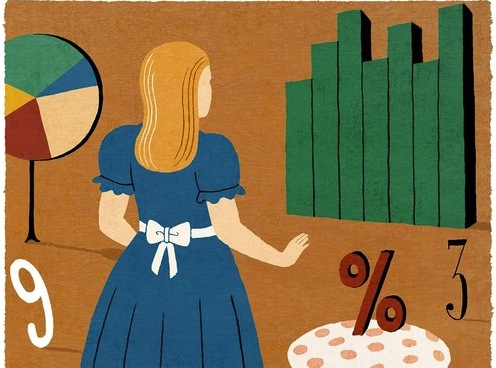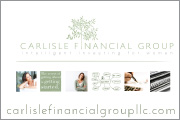November 05, 2013
Turning Daughters Into Investors
{The following is reprinted from a recent issue of the Wall Street Journal. An important conversation, we think. Check out the recommendations from female financial executives about how to overcome a lack of investing confidence, or how to help instill that confidence in your daughter.}
 Women still trail men in investing confidence despite gains in pay relative to male co-workers and their own husbands, according to a slew of new research.
Women still trail men in investing confidence despite gains in pay relative to male co-workers and their own husbands, according to a slew of new research.
What makes the difference for those women who are willing to max out their 401(k) contributions, manage their individual retirement accounts or engage with their family’s financial adviser? Often, it is their parents—and their ability to see what the money they make by investing can do for the people they love.
First, some statistics: Two in five of the 600 women surveyed for Wells Fargo this past summer said they were “not at all” confident in their ability to invest, even though they had household investible assets of at least $250,000. That matters because investing confidence “seems to be the linchpin” of a number of behaviors that help women increase their savings, such has having a financial plan and a willingness to invest in stocks, in preparation for retirement, says Karen Wimbish, director of Wells Fargo’s retail retirement business.
Things aren’t looking up among women in their 20s, according to additional research sponsored by the bank. Despite their having better pay and fewer commitments outside of work to juggle, “the investing-confidence results are the same,” Ms. Wimbish says. “It’s like talking to their mothers and grandmothers.”
A June survey of 10,045 U.S. adults conducted for Ameriprise Financial found that only 47% of women contribute to a 401(k) account, compared with 55% of men. And while 46% of men say they feel on track for retirement, only 38% of women do. Also troubling: Only 45% of women said their accounts had recovered from prerecession levels, compared with 54% of men’s, raising questions about the ways in which women are allocating their savings.
Despite their rising status as primary breadwinner and “household CFO,” almost half of the 2,213 women surveyed for Allianz Life Insurance last year said that they still fear becoming a “bag lady.”
To overcome a lack of investing confidence, or to instill it in your daughter, here are some recommendations from female financial executives:
Find a mentor—or be one yourself.
Two-thirds of the so-called affluent women in the Wells Fargo survey who feel confident about investing said that someone made a point of teaching them about it. Ms. Wimbish speculates that in many cases, that teacher was the woman’s father.
Chelsea Castner, a 25-year-old personal-finance blogger in New York, says her father, a financial planner, helped her get off on the right foot, prodding her to put her babysitting money into a Roth IRA.
But when it came to saving and investing, “it wasn’t explained unless we asked,” she says. Ms. Castner wasn’t really interested, so she didn’t ask. Her brother did, and so her father spent more time teaching him about investing.
“Luckily, my dad still set me up well, but I never took it upon myself to ask why I was doing those things,” she says. “I think women feel like we don’t have to care, or want to care. But if we know it at an early age, down the road we’ll know how to take care of our money better and why.”
Emily Sanders, a managing director of United Capital Financial Advisers in Atlanta, agrees that “Dad is a huge factor in a woman’s financial independence.” Women encouraged by their fathers are much more likely to engage in financial planning, and with professionals like herself, as adults, rather than leaving those decisions up to their husbands, she says.
Connect investing to what it can accomplish.
“Women are much more keyed into what the money can do for the family. It’s much less of a scorecard for them,” Ms. Sanders says.
United Capital has developed an online tool at HonestConversations.comto help investors discover how their biases might affect their financial decisions, or what the firm refers to as “Your Money Mind.” Its advisers also have found it a useful way to get husbands and wives to start talking about money.
Getting wives, who often are mothers, to get involved in their families’ long-term financial planning, rather than delegating it to their husbands, is often the toughest part of her work, Ms. Sanders says.
“It’s not our job to scare people with gory statistics, but it is our job to help women take control of their lives,” she says. “Women often put themselves last, and when a crisis happens they’re left holding the bag.”
Ms. Sanders’s firm tries to entice female clients with tools, such as having a couple take the Your Money Mind quiz together, or setting up female-friendly events that make them more comfortable so they will ask questions later “in a more private environment,” she says.
Tap into remedial education online.
Ms. Castner, the blogger, says she has asked many friends in their 20s why they haven’t opted into their 401(k) plans.
“The answer is something like, ‘I’m too embarrassed to ask my dad what it means to me,’” she says.
What about parents of college graduates who are concerned that their daughters aren’t getting off on the right foot—but also anticipate that they might not listen to them? They could direct their kids to the bevy of personal-finance websites that have sprung up with both worksheets and educational components, Ms. Castner says, such as Mint, HelloWallet andPersonal Capital.
Another good resource: The website for the 401(k) plan the new worker finds so intimidating. Many workplace plans are adding tools to help employees see how their savings eventually translate into retirement paychecks.
Separately, the U.S. Department of Labor has posted its own calculator ataskebsa.dol.gov/lia/home.
Consider: A 27-year-old investor with a $1,000 account who contributes just $5,000 a year for 40 years would wind up with a monthly income in retirement of $3,084 a month, based on a 7% annual return and 3% inflation rate.
But if that same 27-year-old maxed out her 401(k) and IRA, she would end up with a total account balance of $2.34 million—and a retirement paycheck of $14,085 a month.
–Email: familyvalue@wsj.com







Leave a Comment